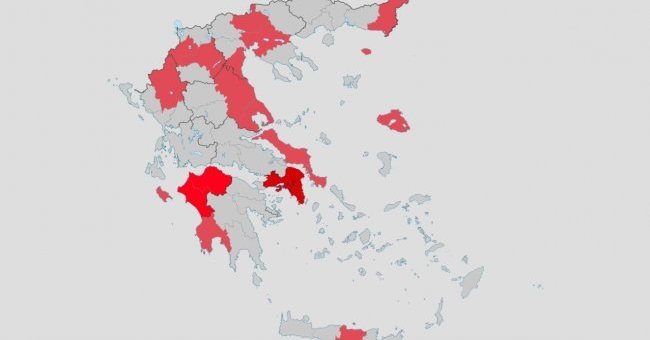The situation foreign migrants in Europe, particularly those in the Greek Aegean Islands, is gradually regaining the severity of 2015’s situation. Since summer 2019, the number of arrivals on European coasts has been multiplying, without any improvement in the response from the Greek government or the EU. The camps on the Greek-Turkish border are more overcrowded than ever, accumulating up to 8 times more people than they have the capacity for [1]. Sanitary conditions are worsening, and the safety of residents, generally speaking, is not at all guaranteed. The spread of the virus, fires, protests: daily life is difficult for these persecuted communities.
Why so many new arrivals on the Greek islands in recent months?
Recent crossings have been prompted by the approach of a change in government in Greece - a new government took office in autumn 2019 and took measures to tighten the asylum procedure in Greece - as well as the opening of the Greek-Turkish border by the President of Turkey at the end of February this year.
President Erdoğan’s change of attitude was much dreaded by European leaders. It arose following the EU’s policy of non-intervention during the humanitarian crisis in Idlib, the last Syrian region that President Assad intends to recapture to eliminate the remaining Islamist groups from his territory. The inhabitants of the region, victims of the bombardments by the Syrian regime and Russian offensives, hope to find refuge in Turkey. However, Erdoğan, who has already allowed 3.7 million migrants into Turkey, refused to open Turkey’s doors to more people.
Aiming to put pressure on the EU to negotiate a ceasefire with Putin and Assad, to get support from NATO, and to try and revise the migrant crisis agreement between Turkey and the EU, Erdoğan withdrew his patrols at the Greek border, allowing millions of asylum seekers then residing in Turkey to make their way towards Greece. Kyriákos Mitsotákis, Greece’s Prime Minister, has therefore tightened Greek border controls with teams from the European Border and Coast Guard Agency (Frontex). Europe’s security response at the Greek-Turkish border has resulted in some major disagreements, recently causing the death of a man shot in the neck by authorities.
Furthermore, this tragedy is accompanied by the demonstrations that have been taking place for several weeks in Lesbos. The island’s inhabitants are demanding an adapted European response to the flow of migrants, in particular relocating asylum seekers to other EU member states. A minority of Greek protestors have shown an extremely hostile attitude towards the newly arrived migrants, the residents of Moria camp, and humanitarian workers from various NGOs on the island. The majority of these organisations had to evacuate Lesbos at the beginning of March, leaving the residents of Moria in turmoil. Médecins Sans Frontières, one of the only two NGOs left working on the island, announced an additional particularly worrying difficulty: the arrival of COVID-19 in Lesbos. Indeed, the first case of the virus was confirmed by health authorities in the week commencing 9th March. It is, therefore, likely that residents of Moria will also fall victim to the virus in the coming days.
The arrival of a killer virus in already poor sanitary conditions
In Moria, the largest refugee camp on both the island of Lesbos and in Europe, displaced people are living in tents that are far too small to accommodate a family, especially considering that these tents are the only shelter they have. Despite the efforts of NGOs, very young children spend the winter there without coats and shoes. Toilets are few and far between, and privacy is scarce due to overcrowding. In addition, there is no public system to manage the waste generated by the camp’s 20,000 residents. NGOs do it instead. They collect residents’ waste and arrange for its disposal by private organizations. Children play in heaps of waste and sometimes find decomposed animal remains. The lack of hygiene in Moria is an issue of serious concern. It is very difficult to wash clothes there, which is something residents do much less often than they would like.
Unsurprisingly, these conditions are incompatible with the application of any health measures advised by European governments in recent weeks, in response to the spread of the COVID-19 virus. How can you make sure you always keep a metre’s distance from your neighbor when tents are sometimes only a metre apart? How can you wash your hands frequently when water points are often several hundred meters from where you live? In a press release a few days ago, a Médecins Sans Frontières doctor stated that "In some parts of the Moria camp, there is only one water point for 1,300 people and no soap. Families of five or six have to sleep in spaces no larger than 3m². This means that recommended measures such as frequent handwashing and social distancing to prevent the spread of the virus are simply impossible.”
On 17 March, the Greek government announced measures to limit the spread of the virus in reception centres and camps, such as establishing a health check for new arrivals and suspending the entry of humanitarian staff into the camps for at least 14 days. Even more alarming is the fact that the submission of asylum applications in Greece has been also been halted for a minimum of one month.
The political consequences of the virus spreading in refugee camps
The new measures taken by the Greek government, although protective, will certainly cause serious collateral damage for the refugees, and could lead to the further detention of asylum seekers, whose relocation is already seriously compromised. With these populations being particularly vulnerable to the virus, their movement from one country to another has been blocked for the foreseeable future. Though the success rate of relocation is low ordinarily, it will now most certainly be non-existent until long after the confinement in European countries is over. Furthermore, the spread of COVID-19 in Greek and Italian refugee camps is being used as an additional argument by political groups hostile to the relocation of refugees, and could also contribute to a strengthening the secure management of asylum in Europe.
On March 9, Erdoğan applied for EU financial aid to help Turkey accommodate the displaced population, however, no agreement was reached that day. On March 17, a remote meeting was held, bringing together the German Chancellor, the President of the French Republic, the British Prime Minister and the Turkish President. This meeting, - largely motivated by the spread of the virus - focused on the management of the humanitarian disaster in Idlib [3]. This meeting also gave Erdoğan the chance to discuss a new agreement between Turkey and the EU on the management of migratory flows. However, this subject was not a priority for the leaders on 17th March.
The issue will be discussed in more detail at the European Council on 26 and 27 March. Until then, asylum seekers in Europe and Turkey will remain particularly at risk in the face of the pandemic.


Follow the comments: |
|
